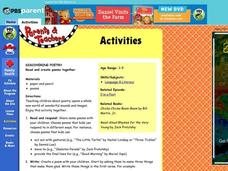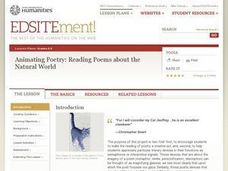Curated OER
Using Poetry in Teaching Reading to Special Education Students
A series of well-written activities, these lessons prompt middle schoolers reading below grade level (at a second, third, or fourth grade level) to use poetry to practice basic reading skills. They rhyme, build words, make inferences,...
Macmillan Education
Understanding Poetry
William Wordsworth's "Daffodils" provides young poets with an opportunity to examine how a poet can use powerful images and poetic devices to create vivid pictures in the minds of readers.
Curated OER
Discovering Poetry
Poetry is such a wonderful form of writing. Young children naturally gravitate to it because of the the wonderful imagery and the rhyming of the words. After sharing some poems with your kids, they work together to create a class poem....
Curated OER
Virtual) Poetry Slam
Students create a "virtual poetry slam." This project can easily be implemented at any grade level where students have created short pieces of personal writing. They write, edit, and revise a short piece of poetry or personal writing.
Laura Candler
Bio Poems Made Easy
A creative way bring autobiographical writing to your poetry unit or back-to-school curriculum, this lesson plan guides you through a bio poem activity. Kids use the graphic organizer to describe themselves using adjectives, things...
Poetry4kids
Simile and Metaphor Lesson Plan
Similes and metaphors are the focus of a poetry lesson complete with two exercises. Scholars read poetry excerpts, underline comparative phrases, then identify whether it contains a simile or metaphor. They then write five...
National Endowment for the Humanities
Practical Criticism
As an introduction to literary criticism, class members recreate I.A. Richards' close reading experiment. Individuals select a poem, paraphrase the story, focus on the imagery used, consider what the imagery adds to the tale, and...
Curated OER
Making Objects Human
Explore poetry, personification, and multiple languages with a poetry reading and writing lesson. After the teacher reads the poem to the class, a discussion about personification follows. The class then writes a collaborative poem...
Curated OER
Breaking up a Poem
Complete with a SMART board presentation and all necessary materials, this lesson plan guides seventh graders through the process of writing poems and utilizing line breaks. After reading through the presentation and different examples,...
Curated OER
Reading and Responding: Lesson 9
Follow this instructional activity, which is written more like a script, to practice reading a poem with your class. Pupils read "The Road Not Taken" and respond to five multiple choice questions on a provided worksheet. The plan leads...
Curated OER
Langston Hughes Was a Dreamer Too
Encourage your pupils to imagine their own dreams for the future. After studying three poems by Langston Hughes and listening to Dr. Martin Luther King, Jr.’s I Have a Dream speech, young poets craft their own dream stanza.
National Park Service
A Natural Resource Called Peace
Get your pupils outside and teach them about peace at the same time! Scholars create a list describing peace, hike outside, add to that list, and later create poems. The exercises support differentiation for your individual classes as...
American Battlefield Trust
Creating Civil War Multimedia
What was it like to live through the Civil War? Learners investigate the question by creating multimedia presentations. With a scaffolded approach that includes research, creating a biopic poem, storyboard, and then polished multimedia...
Curated OER
Journeying to Create
Show a video clip that descripes how taking a journey can change a person's outlook on life. Learners write a paragraph about a place that uses imagery and tone to create a specfic effect. They evaluate their journal entries as well.
Curated OER
Poem in Your Pocket Day: Ideas for Celebrating
First instituted in New York City in 2002 and recognized nationwide in 2009, "Poem in Your Pocket Day" is part of National Poetry Month (April) and celebrates poetry in everyday life. A brief news story includes 9 ideas about how to...
Curated OER
Poetry Group Activity
In this Romeo and Juliet worksheet, students complete a group project by creating a poem on an assigned topic relating to themes found in Romeo and Juliet.
Curated OER
Guided Reading: Three Little Pigs (Plus Wolf: Javalinas)
Guide your class through reading various versions of The Three Little Pigs. Talk about the traditional story line and then discuss a different point of view: Maybe the wolf was just an innocent bystander! This lesson plan, which has...
National Endowment for the Humanities
Animating Poetry: Reading Poems about the Natural World
Young scholars complete poetry analysis activities. In this poetry analysis instructional activity, students consider the use of imagery and sound devices in poetry. Young scholars translate poetry into another art, read a diverse...
Curated OER
Poetry Slams and Lesson Plans
Poetry slams can lead your students beyond a focus on rhyme and meter and into the emotional pull of poetry.
Curated OER
Ho Ho Poetry
Students read about the sights and sounds of a Las Vegas Christmas. They use words and phrases taken from articles in a recent issue of the New York Times to create a holiday-themed "found Poem."
Curated OER
Write Your Own Poem
In this wring a poem learning exercise, students find words that rhyme with ones given and use these rhyming pairs of words to create sentences and two line poems that rhyme. Students write twenty answers.
K12 Reader
Poetry Uses Rhyme
It's rhyme time! After reading a short article about poems that rhyme, kids take the time answer questions about the message of the passage.
K12 Reader
Adding Alliteration to Poetry
Alliteration can make the language of a poem flow. Add adjectives to several blanks in two poems to form alliterative phrases.
EngageNY
Peer Critique of “Inside Out” and “Back Again” Poems
Class members closely examine the use of words in the poems "Inside Out" and "Back Again" to determine if different words would create more powerful poetry. They then conduct peer reviews of the poems they created and offer suggestions...























